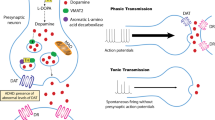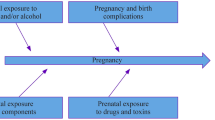Abstract
Rationale
Autism spectrum disorder (ASD), the fastest growing neurodevelopmental disorder, is characterized by social deficits, repetitive/stereotypic activity, and impaired verbal and nonverbal communication and is commonly diagnosed at early stages of life. Based on the excitatory-inhibitory imbalance theory of autism, some recent animal experiments have reported amelioration in autistic-like phenotypes in adult animals following acute treatment of NMDA antagonists. However, we suggested the neonatal period as a critical period for NMDA antagonist intervention.
Objectives
This experiment was designed to determine the role of postnatal MK-801, an NMDA receptor blocker, in the prenatal valproic acid (VPA) rat model of ASD.
Methods
The model of autism was induced by subcutaneous administration of valproic acid (600 mg/kg) to pregnant rats at gestational day 12.5. The effects of MK-801 (0.03 mg/kg, from postnatal day 6–10) in correcting ASD-associated behaviors in male offspring were assessed by open-field, three-chambered social interaction tests. Moreover, the nociceptive threshold was measured by tail flick and hot plate. Behavioral tests were performed on PND 55–60. Nissl staining was performed to confirm the safety of 0.03 mg/kg MK-801 for the brain.
Results
We reported that MK-801 rescued social deficits, repetitive behaviors (self-grooming), anxiety-related behavior, and the low nociceptive threshold in the VPA-treated rats. Further, histological examination showed that there were no significant differences among all the groups in terms of the neuronal survival rate.
Conclusions
Our results showed that postnatal low-dose MK-801 improved ASD-associated behaviors in the VPA-treated rats and that early exposure to NMDA antagonist resulted in permanent changes in adult behavior.





Similar content being viewed by others
References
Baronio D, Castro K, Gonchoroski T, de Melo GM, Nunes GDF, Bambini-Junior V, Gottfried C, Riesgo R (2015) Effects of an H3R antagonist on the animal model of autism induced by prenatal exposure to valproic acid. PLoS One 10:e0116363. https://doi.org/10.1371/journal.pone.0116363
Ben-Ari Y, Khalilov I, Kahle KT, Cherubini E (2012) The GABA excitatory/inhibitory shift in brain maturation and neurological disorders. Neurosci 18:467–486. https://doi.org/10.1177/1073858412438697
Benger M, Kinali M, Mazarakis ND (2018) Autism spectrum disorder: prospects for treatment using gene therapy. Mol Autism 9:39. https://doi.org/10.1186/s13229-018-0222-8
Blume SR, Nam H, Luz S, Bangasser DA, Bhatnagar S (2018) Sex- and age-dependent effects of orexin 1 receptor blockade on open-field behavior and neuronal activity. Neuroscience 381:11–21. https://doi.org/10.1016/j.neuroscience.2018.04.005
Chung C, Ha S, Kang H, Lee J, Um SM, Yan H, Yoo YE, Yoo T, Jung H, Lee D, Lee E, Lee S, Kim J, Kim R, Kwon Y, Kim W, Kim H, Duffney L, Kim D, Mah W, Won H, Mo S, Kim JY, Lim CS, Kaang BK, Boeckers TM, Chung Y, Kim H, Jiang YH, Kim E (2018) Early correction of N-methyl-D-aspartate receptor function improves autistic-like social behaviors in adult Shank2-/- mice. Biol Psychiatry 85:534–543. https://doi.org/10.1016/j.biopsych.2018.09.025
Crawley JN (2004) Designing mouse behavioral tasks relevant to autistic-like behaviors. Ment Retard Dev Disabil Res Rev 10:248–258. https://doi.org/10.1002/mrdd.20039
Dietz C, Swinkels S, Van Daalen E et al (2006) Screening for autistic spectrum disorder in children aged 14-15 months. II: population screening with the early screening of autistic traits questionnaire (ESAT). Design and general findings. J Autism Dev Disord 36:713–722. https://doi.org/10.1007/s10803-006-0114-1
du Bois TM, Huang X-F (2007) Early brain development disruption from NMDA receptor hypofunction: relevance to schizophrenia. Brain Res Rev 53:260–270. https://doi.org/10.1016/j.brainresrev.2006.09.001
Gao CJ, Niu L, Ren PC, et al (2012) Hypoxic preconditioning attenuates global cerebral ischemic injury following asphyxial cardiac arrest through regulation of delta opioid receptor system. Pergamon
Hensch TK (2004) Critical period regulation. Annu Rev Neurosci 27:549–579. https://doi.org/10.1146/annurev.neuro.27.070203.144327
Herlenius E, Lagercrantz H (2004) Development of neurotransmitter systems during critical periods. Exp Neurol 190:8–21. https://doi.org/10.1016/J.EXPNEUROL.2004.03.027
Huang K, Wang Z, Gu Y, et al (2018) Glibenclamide prevents water diffusion abnormality in the brain after cardiac arrest in rats. Humana Press Inc.
Ikonomidou C, Bosch F, Miksa M, Bittigau P, Vöckler J, Dikranian K, Tenkova TI, Stefovska V, Turski L, Olney JW (1999) Blockade of NMDA receptors and apoptotic neurodegeneration in the developing brain. Science 283:70–74
Kang J, Kim E (2015) Suppression of NMDA receptor function in mice prenatally exposed to valproic acid improves social deficits and repetitive behaviors. Front Mol Neurosci 8:17. https://doi.org/10.3389/fnmol.2015.00017
Kerr DM, Downey L, Conboy M, Finn DP, Roche M (2013) Alterations in the endocannabinoid system in the rat valproic acid model of autism. Behav Brain Res 249:124–132. https://doi.org/10.1016/j.bbr.2013.04.043
Kim KC, Lee DK, Go HS, Kim P, Choi CS, Kim JW, Jeon SJ, Song MR, Shin CY (2014) Pax6-dependent cortical glutamatergic neuronal differentiation regulates autism-like behavior in prenatally valproic acid-exposed rat offspring. Mol Neurobiol 49:512–528. https://doi.org/10.1007/s12035-013-8535-2
Kim JW, Seung H, Kim KC, Gonzales ELT, Oh HA, Yang SM, Ko MJ, Han SH, Banerjee S, Shin CY (2017) Agmatine rescues autistic behaviors in the valproic acid-induced animal model of autism. Neuropharmacology 113:71–81. https://doi.org/10.1016/j.neuropharm.2016.09.014
Kim J-W, Park K, Kang RJ, Gonzales ELT, Kim DG, Oh HA, Seung H, Ko MJ, Kwon KJ, Kim KC, Lee SH, Chung CH, Shin CY (2019) Pharmacological modulation of AMPA receptor rescues social impairments in animal models of autism. Neuropsychopharmacology 44:314–323. https://doi.org/10.1038/s41386-018-0098-5
Kumar H, Sharma B (2016) Memantine ameliorates autistic behavior, biochemistry & blood brain barrier impairments in rats. Brain Res Bull 124:27–39. https://doi.org/10.1016/j.brainresbull.2016.03.013
Latysheva NV, Rayevsky KS (2003) Chronic neonatal N-methyl-D-aspartate receptor blockade induces learning deficits and transient hypoactivity in young rats. Prog Neuro-Psychopharmacology Biol Psychiatry 27:787–794. https://doi.org/10.1016/S0278-5846(03)00110-6
Lewis MH, Tanimura Y, Lee LW, Bodfish JW (2007) Animal models of restricted repetitive behavior in autism. Behav Brain Res 176:66–74. https://doi.org/10.1016/j.bbr.2006.08.023
Lim AL, Taylor DA, Malone DT (2012) Consequences of early life MK-801 administration: long-term behavioural effects and relevance to schizophrenia research. Behav Brain Res 227:276–286. https://doi.org/10.1016/j.bbr.2011.10.052
MMed ML, Liu X, Zhang Y, Guo S-W (2012) Valproic acid and progestin inhibit lesion growth and reduce hyperalgesia in experimentally induced endometriosis in rats. Reprod Sci 19:360–373. https://doi.org/10.1177/1933719111424453
Moy SS, Nadler JJ, Perez A, Barbaro RP, Johns JM, Magnuson TR, Piven J, Crawley JN (2004) Sociability and preference for social novelty in five inbred strains: an approach to assess autistic-like behavior in mice. Genes, Brain Behav 3:287–302. https://doi.org/10.1111/j.1601-1848.2004.00076.x
Nader R, Oberlander TF, Chambers CT, Craig KD (2004) Expression of pain in children with autism. Clin J Pain 20:88–97
Nozari M, Mansouri FAFAFA, Shabani M et al (2015) Postnatal MK-801 treatment of female rats impairs acquisition of working memory, but not reference memory in an eight-arm radial maze; no beneficial effects of enriched environment. Psychopharmacology 232:2541–2550. https://doi.org/10.1007/s00213-015-3890-5
Padurariu M, Antioch I, Ciobica A et al (2017) Intranasal oxytocin in autism: models, pain and oxidative stress. Rev Chim 68
Paxinos G, Watson C (2013) The rat brain in stereotaxic coordinates : hard Cover Edition. Elsevier Science
Presti MF, Mikes HM, Lewis MH (2003) Selective blockade of spontaneous motor stereotypy via intrastriatal pharmacological manipulation. Pharmacol Biochem Behav 74:833–839. https://doi.org/10.1016/S0091-3057(02)01081-X
Samango-Sprouse CA, Stapleton EJ, Aliabadi F, Graw R, Vickers R, Haskell K, Sadeghin T, Jameson R, Parmele CL, Gropman AL (2015) Identification of infants at risk for autism spectrum disorder and developmental language delay prior to 12 months. Autism 19:327–337. https://doi.org/10.1177/1362361314521329
Schneider T, Przewłocki R (2005) Behavioral alterations in rats prenatally exposed to valproic acid: animal model of autism. Neuropsychopharmacology 30:80–89. https://doi.org/10.1038/sj.npp.1300518
Schneider T, Przewocki R (2001) Preliminary communication nociceptive changes in rats after prenatal exposure to valproic acid. europepmc.org 531–534
Tyzio R, Cossart R, Khalilov I et al (2006) Maternal oxytocin triggers a transient inhibitory switch in GABA signaling in the fetal brain during delivery. Science (80- ) 314:1788–1792. https://doi.org/10.1126/science.1133212
W. S, L. L, A. G, L. S (2012) Synapse dysfunction in autism: a molecular medicine approach to drug discovery in neurodevelopmental disorders. Trends Pharmacol Sci 33:669–684. https://doi.org/10.1016/j.tips.2012.09.004LK
Won H, Lee H, Gee H, et al (2012) Autistic-like social behaviour in Shank2-mutant mice improved by restoring NMDA receptor function. nature.com
Zhang-James Y, Yang L, Middleton FA, Yang L, Patak J, Faraone SV (2014) Autism-related behavioral phenotypes in an inbred rat substrain. Behav Brain Res 269:103–114. https://doi.org/10.1016/j.bbr.2014.04.035
Zwaigenbaum L, Bryson S, Rogers T, Roberts W, Brian J, Szatmari P (2005) Behavioral manifestations of autism in the first year of life. Int J Dev Neurosci 23:143–152. https://doi.org/10.1016/J.IJDEVNEU.2004.05.001
Funding
This research article is a part of the first author’s M.Sc. thesis. Funding for this study was provided by Kerman University of Medical Sciences, Kerman, Iran (Grant ID: 96000183).
Author information
Authors and Affiliations
Corresponding authors
Ethics declarations
All the following experiments and animal care protocols were approved by the Animal Experiment Committee at the Kerman Medical University (Ethics code: IR.KMU.REC.1396.183) and performed in line with the “NIH Guide for the Care and Use of Laboratory Animals.”
Conflict of interest
The authors declare that there are no conflicts of interest.
Additional information
Publisher’s note
Springer Nature remains neutral with regard to jurisdictional claims in published maps and institutional affiliations.
Rights and permissions
About this article
Cite this article
Mohammadi, S., Asadi-Shekaari, M., Basiri, M. et al. Improvement of autistic-like behaviors in adult rats prenatally exposed to valproic acid through early suppression of NMDA receptor function. Psychopharmacology 237, 199–208 (2020). https://doi.org/10.1007/s00213-019-05357-2
Received:
Accepted:
Published:
Issue Date:
DOI: https://doi.org/10.1007/s00213-019-05357-2




